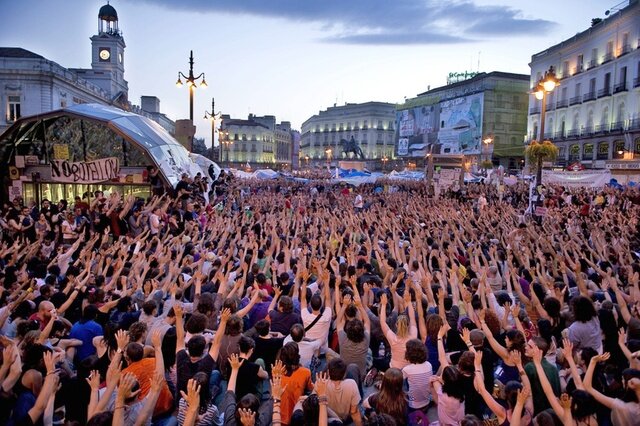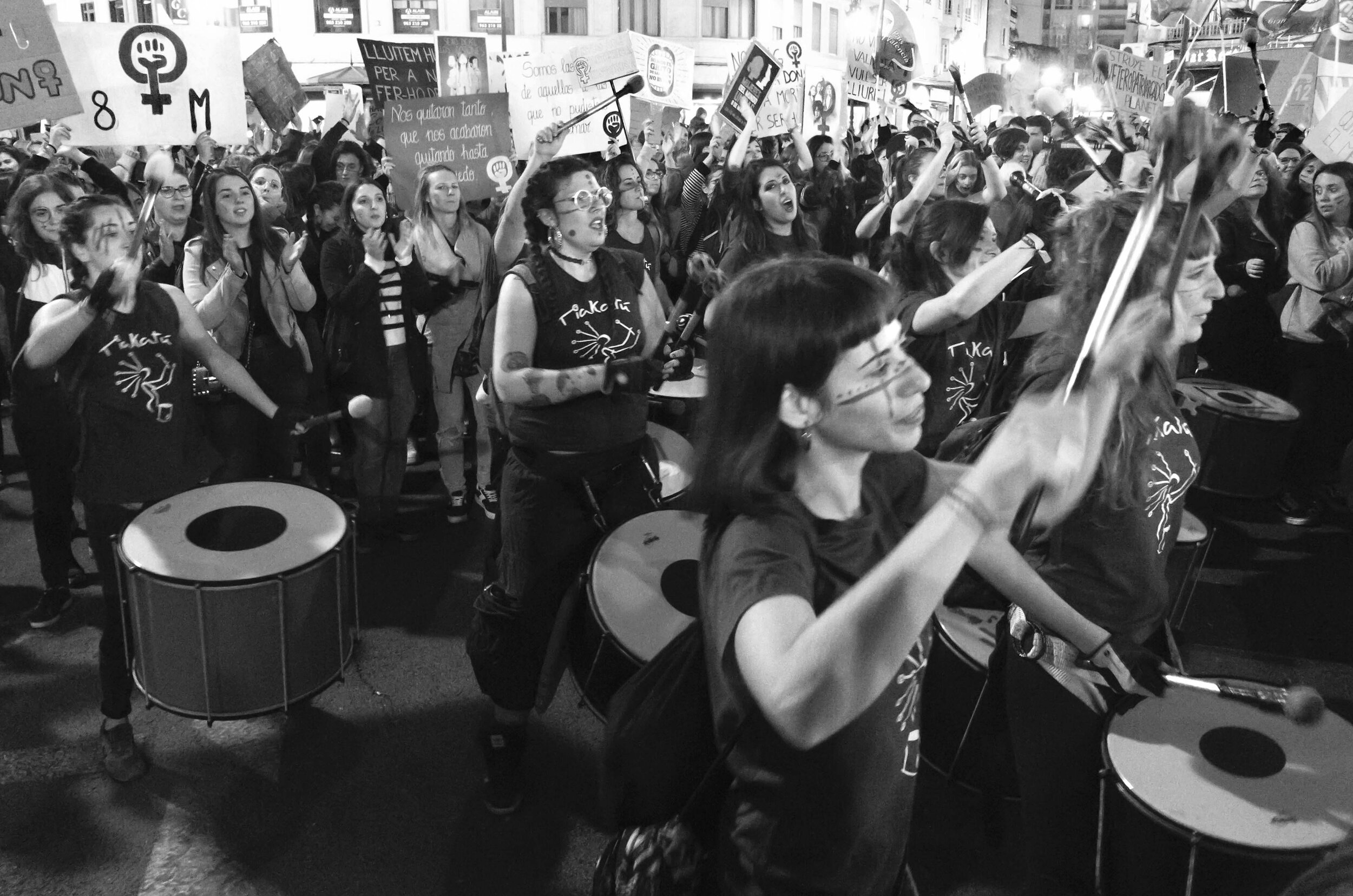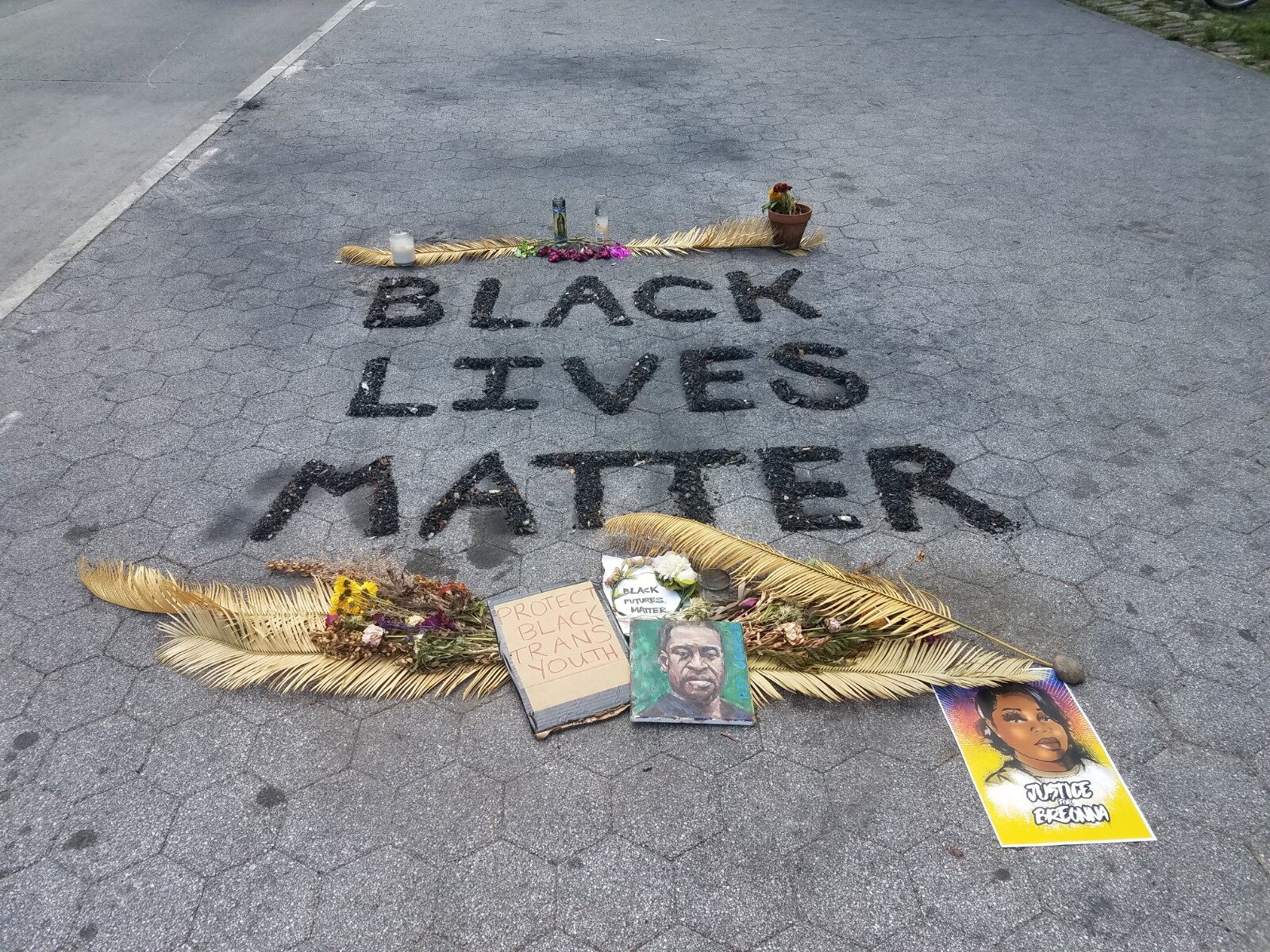The renaming soon showed to made a lot of sense however, as the logic of the political work being done in the neighbourhoods and across thematic areas came to open a processual horizon about reinventing institutional politics from below, building structures and horizons that were no longer just about winning. A collective force had been set loose through common, open processes of elaborating electoral programmes, through joint researching and discussion, as well as joint campaigning and reaching out.[16] Appropriately, ‘En Comú’ pointed to a how, a way of doing things, rather than to a what. More on this process in the section on municipalist micropolitics—for now I will conclude this genealogy of commons by pointing to similar genealogies beyond Spain.
Previous and parallel developments in Latin American institutions
The experiences of the new Latin American Left, from the beginning of the 2000s to their decline a decade or two later, have been eagerly observed in election-bound circles in Spain. Here, thought on the commons and their relation to governance and electoral politics was more ripe already, having generated not just new horizons and processes but also a series of failures and critiques. Particularly those countries where new, non-party movements swept a new political class to power (as in Bolivia and Ecuador) have yielded some lessons on the potentials and pitfalls of running for government. But Argentina, Mexico, Brazil and Venezuela too have produced rich debates about the new left ‘gobernismo’ (‘governism’) and its relation to social autonomy. Key Latin American thinkers for these debates on commons and governance include Raquel Gutiérrez, Bolívar Echevarria, Alberto García Linera, Rita Laura Segato, Colectivo Situaciones and Maria Gallindo. Raquel Gutiérrez, who has been to Spain for conversations about and with new electoral movements[17], from Podemos[18] to municipalisms, bases her analysis in social struggles rooted in commons –water movements in Bolivia, for example, with strong indigenous protagonism. From the viewpoint of these struggles, she interrogates and documents social movements and political processes in several countries in Latin America[19] and insists that building power through commons hinges on a collective capacity:
When we speak of the production of the common, we don’t just speak about a way of managing or a kind of access or some such thing, we are talking about unfolding the collective capacity to generate material wealth –autonomous in some form– that can allow us to conquest fields of political autonomy (my translation from Spanish)[20].
Contrary to more technocratic and formulaic notions of commons management, which have found a place in some Latin American popular governments, Gutiérrez thinks about building power as a collective, embodied and material process. Building power involves transversalities and strategies that reach across different social fields[21] as well as the production of subjectivities. Commons entail a form of material and subjective production that must be autonomous, argues Gutiérrez. This does not mean they do not ‘talk to’ state agencies or negotiate with institutional actors, but that they determine their own meanings, uses and framings.
The Colectivo Situaciones in Argentina, too, are interested in micropolitical and collective subjective processes that come with crisis, rebellion and left institutional politics. In 2009, they made a book to reflect on the political ‘impasse’ engendered by Kirchnerism in Argentina and its implications for social movements[22]. One key aspect of this concerns a crisis of language:
In the impasse the word ‘politics’ enters into crisis in a precise way: the ‘factory of meaning(fulness)’ is displaced towards the mediatic-managerial sphere, in detriment of collective thinking. …We thus confront a paradox, where whilst all kinds of political discourses circulate, a progressive depoliticization of the social and of language occurs. (my translation from Spanish)[23]
This process of becoming void, or becoming catchphrase, of political language can be observed in a myriad of contexts where institutional or commercial actors appropriate the language of social movement. The ‘common/s’ has been used in an enormous amount of political and institutional initiatives in Spain, from party and candidature names that vary from ‘Barcelona en Comú’ to ‘Catalunya en Comú’ to ‘En Comú Podem’ to the denomination of ‘Los Comúnes’ as a general term of this political camp, and so forth. Largely speaking, the municipal candidatures did not banalize the term to the extent that it becomes void or depoliticized, but as the name gets replicated, it does become a brand name of sorts. Yet it’s not broad use that makes for banalization, it’s the careless appropriation of political terms by those who no longer have any stakes in them. In those municipalist circles with an open ear to local as well as remote genealogies of electoral politics and social movements, there is a struggle to keep ‘the commons’ politically charged. They do not always succeed. Still, my hypothesis here is that it is useful to look at intentions, processes, relations, outcomes and effects in relation to one another, through a micropolitical lens, in order to understand where things go right or wrong.
Minor genealogies II: Feminist subversions of the commons and community
We will now follow a second line of genealogies of the commons in Spain, as rooted in feminisms of social reproduction and care. These take us past the 15M movement and towards the municipalist present of 2020 in yet other ways. I focus this genealogy on childcare, as an aspect of feminist politics often taken to be unrelated to social movements or indeed institutional politics. As a key condition, an embodied challenge and an enabling constraint, childcare is all but anecdotal for politics—not just for policy but indeed also for politics itself. Here we will begin to see how and why childcare shapes politics, as part of a new wave of feminist movements focusing on social reproduction and care.
The 15M, new feminisms and struggles for reproductive rights
The 15M was a powerful catalyst for feminist movements, leading to the development of practices and debates that left a legacy from the streets to the neighbourhoods to the new municipal governments. The powerful work of the feminism commissions of the 15M and the work of a large number of feminist collectives that fought against precarity, racist and sexist labour regimes, restrictive abortion laws, the invisibility of care, and political machism set the scene for a broad social debate on care, care work, interdependency, vulnerability and social reproduction. Feminist groups such as the Feministas Indignadas and Feminisms commissions of the 15M, the Territorio Doméstico migrant domestic worker’s collective, the Precarias a la Deriva and Agencia Precaria collectives of precarious female labourers, the Escalera Caracola social Center in Madrid, and books such as Nuevos Feminismos (Silvia López Gil, 2011), Economía Feminista (Amaia Perez Orozco, 2014), Caliban y la Bruja (Silvia Federici, reprinted 2010) and Cojos y Precarias Haciendo Vidas que Importan (Foro de Vida Independiente and Agencia de Asuntos Precarios Todas a Zien, 2011) facilitated a broad and very lively debate on new feminist horizons, practices and struggles in common. Those that preexisted 2011 found new force and inspiration in the 15M, while new generations of feminists were politicized via the groups that sprang from the 15M.
In 2013, the feminist forces of the 15M were propelled by the attempt of the conservative minister Gallardón to illegalize abortion in Spain. The Partido Popular government approved a law that would undo 30 years of feminist institutional struggles and achievements, bringing back memories of the Franco era and sparking large-scale outrage across society and its movements. The new conservative affront was part of an anti-feminist neoliberal political package that included drastic cuts to healthcare and education, seeking to enforce a model of society where people would again rely solely on their families for their reproduction. The link between precarity, women’s rights and reproductive labor came to be blatantly clear and massive counter-mobilizations ensued. As is often the case, reactionary attack summoned forces that were to outlast it. Gallardón stepped down as a minister in 2014, and his law went into the dustbin of history: at the same time, the streets, squares and neighbourhoods were still vibrant with feminist debates and organization. The renewed anti-abortion movement was questioning reproductive rights in broad terms, drawing on second-wave feminist demands of reproductive autonomy, as well as developing new viewpoints in relation to care and interdependence. A new feminist cycle had begun.
The 15M engaged not just younger feminists, but also a generation of activists that had been struggling against precarity and patriarchal political cultures in years prior (as well as many older generations). Many of them were women now in their 30s, questioning models of activism and confronting challenges about sustainable setups of home, care networks and families as well as work[24]. With this came questions about parenthood, for many. Thus there started to be murmurs about the need to claim reproductive justice not just in relation to abortion, but to also fight towards new horizons of social reproduction and care, against the precarity and isolation of women and feminized subjects (those deemed vulnerable, essentially). Multiple jobs, temporary and underpaid contracts, informal work arrangements, lack of labour- and social rights, rising rents and instable housing arrangements, all played their part in a crisis of social reproduction that was affecting people’s lives. Too much for capital, too little for lives.
How to even imagine building a family? Whether it was singles, couples or larger nuclei of people that were asking this question. Whether they were heterosexual (the majority), queer (many), lesbian, gay, intersex, trans (many) and so forth, the sustainability of lives in common, and the possibility of building cross-generational alliances and homes came to be a key concern. Family should be a matter of choice too, to the extent that people can embrace one another and set limits as well as spaces for themselves: many young and not-so-young people were forced to move back to their parents homes due to the financial crisis and its unemployment, in southern Europe in particular. Conservative politics was to set people back to having no choice but to stick with their families, no matter how abusive that might have been, for children and mothers in particular. The rate of machist gender-based murders and violence was and is high in Spain (as in many other countries), increasing in times of crisis when people are confined to the home. New feminist and LGBTQI+ movements picked up on this since the financial crisis, bringing new demands to the fore: against gender-based violence but also for autonomous networks of care and reproduction (including demands to do with assisted reproduction, same-sex marriage, safe spaces, combatting transphobia, and more). In this way, care and reproduction came to take on new significance in feminist and allied movements.
As the 15M grew and matured, alliances were increasingly forged across feminist groups and domestic workers’ struggles (with the Territorio Doméstico collective at the forefront), disabled people’s groups (with the Foro de Vida Independiente, for instance) and pensioners (the Yayoflautas movement), all of whom were vulnerable and acutely threatened by the PP’s policies. The question of vulnerability and sustaining life –always as a matter of dignity and solidarity, not pity and charity– had become common in the face of the brutal cuts that impacted millions of people’s lives. These debates and struggles emerged in the same manner as those around childcare: slowly, at times timidly, gaining confidence and visibility as they drew strength from one another. The politics of care was collectively developed in bouts, by mothers with young children who had their hands full, by migrants and disabled people who had yet to strengthen and connect their platforms, by LGBTQI+ people making experiments and new claims. Still, the politics of care was new territory for feminism, and even more so for social movements in general.
A new politics of interdependence: the case of childrearing
In this often invisible but powerful way, the 15M movement was a key catalyst for the emergence of a series of projects and practices that seek to politicize care and address the increasing need for alternative infrastructures of reproduction, in the face of drastic cuts to public services and soaring unemployment. Those articulations brought a wealth of new notions, practices and alliances to the fore. Let’s take the neighbourhood of Poble Sec in Barcelona, on which I will dwell in my account of childcare here. Poble Sec is one of those more organized, radical neighbourhoods in Barcelona, with lively grassroots movements and neighbourhood politics. It is worth the attention in this account of childcare commoning because it brought forth not just one of the first radical projects in town, but also a singular alliance of self-organised childcare projects, as we shall see in the following section of this book. Sticking with 2011 for now, we return to the vibrant energies of the 15M and the feats, feasts and festivals of collective intelligence and experimentation they brought forth. Like any neighbourhood that wasn’t totally desolate in 2011, Poble Sec had its local 15M assembly. Meeting regularly on squares, this is where neighbourhood problems and projects were discussed. Feminists of different inspirations were part of this too.
Some of the feminist activists of the 15M were pregnant at the time, looking to build sustainable arrangements of care across their mono- and duoparental units, to build a mutliparental constellations of queer, hetero and activist spirits to raise their children within. They had met in the post-partum classes of the local health center and in the local 15M assembly, key spaces of intersection for conversations and complicities. Sharing precarious living conditions, a desire for change and the need to collectivize childrearing somehow, alongside many questions about motherhood, parenthood and families, these full-bellied beings got talking and thinking. The Poble Sec 15M assembly was criss-crossed by a loose mothers’ network that stemmed from post-partum classes, allowing for a new political-vital thing to be dreamt up: childcare commoning, as I call it here. This took many forms, as we shall see later on, from different mother’s networks to self-organised childcare projects in Poble Sec, the first properly collective of which emerged already in 2011: Babàlia. What started as a mothers’ network providing mutual aid and care, sharing a spaces and taking turns in looking after children, grew into a more solid structure as the children moved from being babies to toddlers. Babàlia soon came to include a pedagogue and fixed schedule, and a space where pedagogues and parents work together to raise children. A grupo de crianza compartida—shared childrearing group—with a distinctively activist, feminist ethos. Rethinking care was on the agenda.
Babàlia is not the first parent and educator-run childcare project in the history of Poble Sec, but it is special because it’s fully collectively run and comes out of social movements. Babàlia inaugurates a new phase of experimentation that runs parallel to feminist and commons movements, spurred by a moment of intense questioning of capitalist and patriarchal modes of social reproduction. Babàlia’s proposal was to question patriarchy and capitalism not just in word but in practice, by developing an affordable, collectively run, feminist space for rethinking childrearing. This meant coming up with a model of childcare that wasn’t centered around wage labour: one where children weren’t immediately[25] handed over to public or private institutions so that mothers could rejoin the labour market, nor left to the home alongside their stay-at-home mothers so that daddy could work. One where children could be subjects, and indeed mothers and fathers too. Though Babàlia did not literally self-describe as a commons, it brought the very question of alternative models of care, and of grupos de crianza compartida as childcare commons, onto the horizon in Poble Sec. An anticapitalist reproductive commons, much in line with the analyses of Silvia Federici who came to Poble Sec too in 2014, having been widely read by local activists, to share thoughts and discussion with feminists struggling around social reproduction.
Due to cuts, public access to early childcare institutions was very limited, and so the emergence of alternative infrastructures of reproduction was born of need as much as conviction. The mix of unemployment and public cuts meant that parents had time for organizing on their hands, but also children: a situation that invites for rethinking the relations between care and politics. As feminists of the 15M took up questions of reproduction, maternity and childrearing, different experiments of collective thinking as well as of organization emerged. The grupos de crianza are part and parcel of this history, as are feminist social centers as loci of experimentation, and feminist self-education spaces. The course ‘El ADN de la Vida. Cuidados, crianza y comunidad’ of the Nociones Comunes platform took place in 2013 in Madrid, connecting and continuing debates and practices on collective childrearing and social movements. Facilitated by feminists and other activists, the course set out to map and debate models of childcare and subjective, collective and social dynamics that occur with care and childrearing. How can we rethink and re-value reproduction and childcare, beyond the binary trap between conservativism and the nuclear family? This meant starting from experience in relatively unchartered territory:










